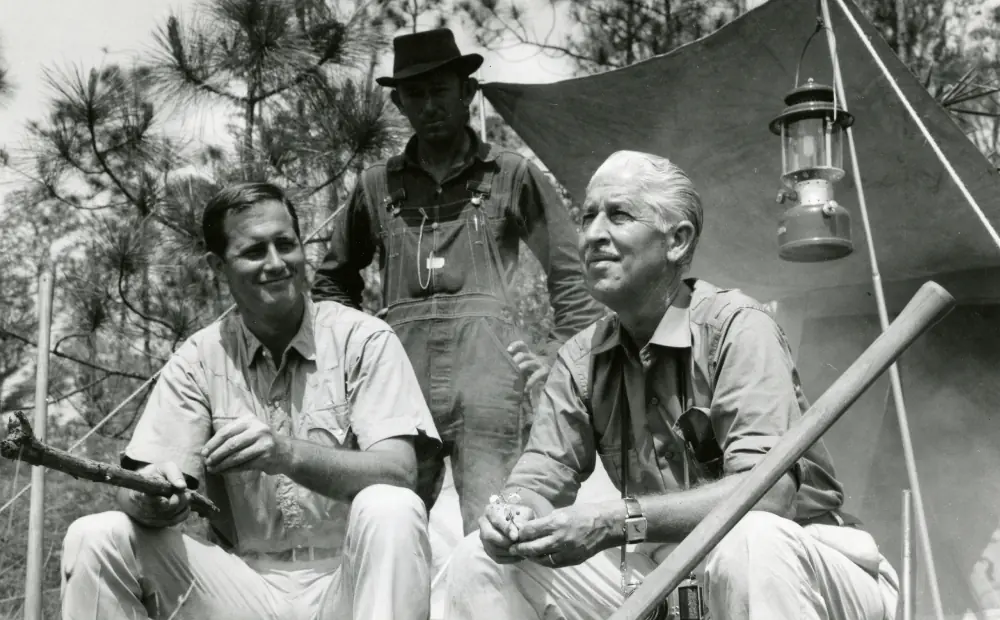0:02
50 years ago, the original host of Mutual of Omaha's Wild Kingdom, Marlin Perkins and Jim Fowler, explored a healthy and vibrant kelp forest off the coast of California.
0:16
They marvel at the incredible diversity of marine life that depend on kelp to survive.
0:24
Today, biologist Tristan Mcgoo and I are diving in the ocean near Fort Bragg.
0:33
But the ocean now is much different than it was.
0:37
Instead of a lush kelp forest, we found purple sea urchins everywhere.
0:42
It makes you really, really sad to see something like that when you know that what could be is this lush bounty forest with thousands of other species there.
0:54
We know that in the North Coast of California, 96% of kelp canopies have been lost.
1:03
Kristen showed me how the urchins attacked the base of the kelp, eating away at the whole fest that keeps it latched to the rocks.
1:12
The oceans are one of our lungs.
1:14
All the oxygen that we breathe is basically coming from either land or sea, but kelp has the ability to produce oxygen at rates that exceed those of terrestrial force, especially being able to turn carbon dioxide into oxygen so that we can breathe.
1:34
Kristen, that was incredible.
1:36
It was.
1:36
Thank you so much for being my dad, buddy.
1:39
Thank you.
1:40
Let's take a look and see what we got out there.
1:42
Sounds great.
1:44
So pretty good visibility.
1:45
You can see all the urchins already working on the base of the kelp pair.
1:50
Yeah, that was wild to see.
1:53
Just that one stock, the way that they pile up on the kelp, and after they're done with that one, they're on to the next one, and it's never ending.
2:01
Would you see that if they still had predators?
2:04
Most likely not.
2:05
The urchin are moving around looking for food right now without fear of a predator.
2:12
My hope here is that sunflower stars can be introduced back into the wild so that they can be that active predator to keep the population of urchin in check and restore ecosystem balance.
2:23
Meanwhile, the loss of kelp forest is posing serious challenges for the animals that rely on it.
2:31
This is the habitat of one of our continent's rarest and most interesting animals, the sea Otter.
2:38
Once, because of extensive fur trapping, they nearly became extinct.
2:43
Now they are protected and extensive conservation studies continue in an effort to rebuild the depleted population.
2:51
Today, southern sea otters are now facing new disasters.
2:55
Their home has been eaten out from underneath them by rampant sea urchins, and they're being attacked by white sharks, a new phenomenon for Monterey Bay, which is a prime sea Otter habitat.
3:11
Marine ecologist Sal Jorgensen surveys the shark numbers to monitor this volatile situation.
3:19
So we're headed on the to the southern part of Monterey Bay.
3:23
This is a very rich feeding area.
3:27
Our goal here is count how many sharks we see to keep track of, you know, the abundance over time.
3:33
You got a shark?
3:40
OK Yeah.
3:44
Wave is breaking right over in there.
3:47
This is a juvenile white shark, which wouldn't normally be found here in the frigid waters of Monterey Bay, but recent warming trends have upended the equation.
3:58
So because of the changes in the water temperature, we're seeing more and more juvenile sharks here.
4:02
Does this affect the outer population at all?
4:05
Yeah, unfortunately, it's putting 2 protected species right up against each other.
4:11
And we have the situation where a white shark, a small white shark, is biting an Otter, thinking that it might be a seal or an elephant seal.
4:22
A seal insulates with blubber.
4:24
An Otter insulates with fur.
4:27
They have the highest fur count of any mammal, a million hairs per square inch.
4:33
When they expect a butterball like a seal, and they end up with a hairball like an Otter, it's a big disappointment for everyone.
4:41
They have powerful teeth and when they investigate something, even if it's a little nibble, they can cause mortal harm.












